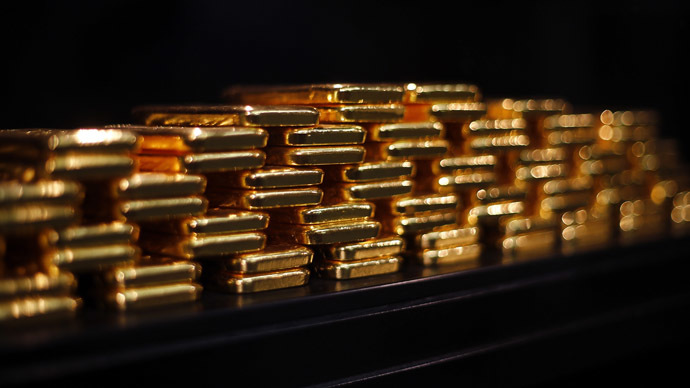'Story of North Korean gold shows real world's interdependence'

It is too premature to make any accusations on the basis that the North Korean gold was found in US products, but shows the level of globalization, economist Мах Fraad Wolff told RT.
On Monday in accordance with the Dodd-Frank Act provision firms were required to report whether they use supplies of gold, tungsten or tin sourced from the Congo region controlled by armed rebels. However, a different fact was also revealed. 68 US companies such as Ralph Lauren and Hewlett-Packard reported they had found gold from North Korea in their products, the use of which is illegal under the current US sanctions against the state.
RT:How is this gold getting into the system?
Мах Fraad Wolff: its clear central banks and various parties have used gold both as currency and in storage of wealth for time immemorial. Therefore, gold bars which are the standard form in which a large amount of gold are held pass around in a very long half life. Partly the reason gold was historically chosen as a currency as it requires very little care to last an extremely long time. What that means is that any particular bar of gold maybe a fascinating history of the world, but dating its initial inception is not easy to do at a glance, and they can reflect an arrangement and an initial smelting of production process from a bygone country or bygone period of relations between the initial place where was mined and smelted and the place where it finds itself involved.
RT:So, who's to blame in such cases, and what consequences might those firms face?
MW: What we do seem to know here is that variously and through various machinations that we don’t know North Korean gold or gold originally minted, smelted in North Korea into gold bars has found its way into corporate treasuries, corporate coffers here in the US. The bigger issue or question is how did that process take place, is it in any way a violation of anything or is it an interesting one-off story of how wildly gold circulates and how far it may have gotten from its initial or intended place of rest?
RT:It's the first time that US companies have come under scrutiny in such a large scale. Could they have been skirting past the sanctions for years? Are they easy to circumvent?
MW: On a face of it, it is a way too premature and I’m certainly not going to suggest that. I think it’s a good story, it’s a possibility, the story that would have to be far more fully explored and flashed out before anyone should feel comfortable either pointing fingers, or for that matter exonerating any of the potentially involved parties.

RT:We're in a world of globalised supply chains. How can these companies really know every ounce of every component?
MW: It’s a great question. The as yet wholly unknown and completely unproved eventuality that there it is a recent direct trade relationship in which goods or services were rendered in exchange for payment with North Korea, that would be a violation of a raft of both the US and international sanctions in all likelihood. And that would be obviously a sanctionable offence - certainly criminal, certainly liable to various fines and possibly an offence of a larger nature. But it is way too early to make such an accusation without far more substantiation than I've seen.
RT:What triggered the sudden inquiry on where US companies get metals from?
MW: I don’t remember, the reason metals like gold have been so widely used for so long as a currency is they literally last forever, and pass from hand to hand. So, if North Korea produces gold and if they traded it with the third party which went to another third party, which went to another third party that then paid an American company in this gold, there is in no way, no shape and no form of any violation of any law. The question is how it got there and when it got there and under what circumstances. It's an interesting story where a physical object shows the interdependence and the globalization of the world and may require an answer, but it is in no way shape reform in an incontrovertible or definite indictment of any party for any reason.
RT:Does this boil down to the thought that: where big business is concerned, nobody cares about sanctions?
MW: I think it was basically that some of the gold bars and some US corporate treasuries bare the stamp and mark, which is the standard normal situation on a gold bar saying that they were refined or stamped into bars in the so-named Democratic Republic of North Korea. This raises some eyebrows given that it’s very unusual to see anything made in North Korea because of the sanctions and because, let’s be honest, the economy there is not very robust and they are not major exporters of much of anything that we buy here in the US. I think the other thing is that it raises the question about the interdependence and perhaps salacious but interesting story about the possible providence of that particular form of payment.
The statements, views and opinions expressed in this column are solely those of the author and do not necessarily represent those of RT.
The statements, views and opinions expressed in this column are solely those of the author and do not necessarily represent those of RT.












